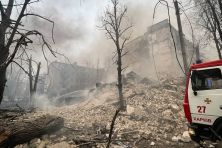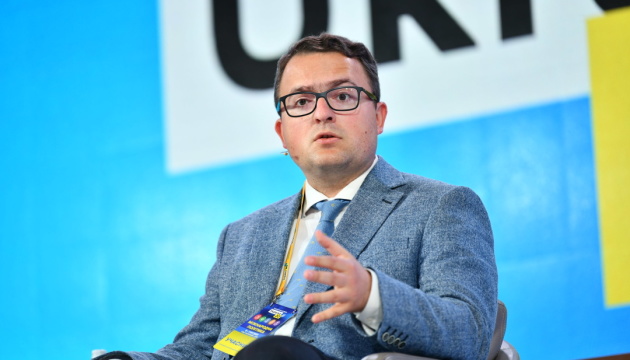The work of the Crimean platform continues for several months. The platform has several tracks – expert, parliamentary and governmental.
What are the successes already achieved within platform? And what still needs to be done? Permanent Representative of the President of Ukraine in the Autonomous Republic of Crimea Anton Korynevych speculated on the issue on air of the ‘5 questions’ program on UA TV.
Oleh Borysov hosts the program.
– How does the Crimean platform work now?
– There can be a number of answers, because, as you know, the Crimean platform has several formats or several tracks. This is an expert track, under which the expert network of the Crimean platform works, and which includes independent experts and expert organizations. As part of this track, they are developing recommendations for state bodies of Ukraine.
The second track is the parliamentary track. The Crimean Platform inter-factional association has been established in the Verkhovna Rada of Ukraine. And this is the relevant work of our parliamentarians, and various parliamentary assemblies of international organizations.
The third track is the governmental track, under which Ukraine acts as a state. It is divided into external and internal track. The Ministry of Foreign Affairs is responsible for the external track, and the Ministry of Foreign Affairs is now doing a very big, important job. In essence, it forms a network of contact persons in different capitals, in governments, in the Ministries of Foreign Affairs of other member states of the Crimean Platform in order to have effective communication and coordination on all issues related to Crimea. A conference on security in the Black Sea region is also planned for February 2022.
And there’s also the internal track of the Crimean Platform, for which the Office of the President of Ukraine in the Autonomous Republic of Crimea is responsible and our Crimean Platform Support Service, which is the national office of the Crimean Platform. We deal with internal affairs in our jurisdiction. Here we are talking about bills and work on the implementation of specific projects.
Last week, the Verkhovna Rada of Ukraine supported a presidential bill on the protection of political prisoners. This is one of the results of the work of the internal track of the Crimean platform.
– Could the developments within the frameworks of the Crimean platform be further used to strengthen sanctions against Russia?
– Of course, because we are talking here about the development, first of all, of our Ukrainian law on sanctions, which we need to amend. We have developed a package of bills under the Crimean platform, which, of course, includes a bill on sanctions. The issue of harmonization of Ukrainian sanctions with sanctions of international partners is also considered.
In fact, we are constantly monitoring everything that is happening in Crimea, including human rights violations, environmental violations – everything that makes the occupying power illegal. We regularly, in a more recommendatory, informative format, pass this information to the state bodies of Ukraine, which may impose sanctions.
– You often invite ministers and ambassadors who are on working visits to Ukraine to the administrative border with the occupied Crimea. What is the current situation with the provision of administrative services at the checkpoints?
– At the end of September 2020, the project of visits of foreign representatives to the administrative border with Crimea began. In fact, we once started to do it, we made sure that no one was on the administrative line with the Crimea, the attention was mostly paid to Donbass. And, while working upon the issue of Crimea, our partners must have an understanding of the situation they can see with their own eyes.
Some 30 delegations visited the administrative border with Crimea. And we’re going to continue the activity we consider very important.
Now we have two checkpoints working on the administrative border with Crimea – those are ‘Kalanchak and ‘Chonghar’. We are in constant contact with the border guards of the Kherson Border Detachment, which serves these two checkpoints.
What is very important – the ‘Kalanchak’ checkpoint has already been transferred to the balance of the Ministry of Reintegration of the temporarily occupied territories. This is very important, because the checkpoint has a fully effective administrator. Everything related to services and everything related to the necessary support of the checkpoint’s activities of both the regime and service zones is now clear, whom to address and who is responsible for it.
It is also very important that an introscope has already been installed at the ‘Chonghar’ checkpoint. This is a special X-ray that can check what’s in a citizen’s personal belongings without a physical examination. This is very important, because it is both the protection of human rights and the security of the state. We hope that soon the same introscope will be installed at ‘Kalanchak’.
Besides, on December 1, administering of internationally recognized vaccines started in the service zone of the ‘Chonghar’ and ‘Kalanchak’ checkpoints. That is, starting December 1, citizens of Ukraine, who move across the administrative border, can get vaccinated with internationally recognized vaccines.
– How many people from the occupied Crimea have already got a jab at the checkpoints?
– The number is significant. People go, see this information, pass it on to the Crimea. Every day there are citizens who get vaccinated. The main issue is to provide information so that people can see, hear, understand and be able to use this service. It may be dozens of people a day.










